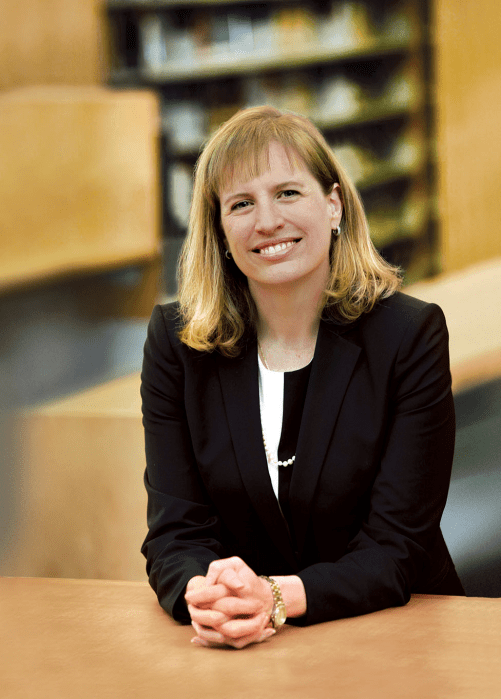Dr. Sharon B. DeVivo is president and chief executive officer of Vaughn College and has been with Vaughn since 1996. She is the seventh president of the institution and the first woman. Vaughn serves a diverse student body of about 1,200 students who are 80 percent minority, mostly first-generation Americans and first-generation college students. Her degrees include an associate’s from the University of Maryland in Munich, Germany, a bachelor’s from the State University of New York at Albany, a master’s from Fordham University and a doctorate from the University of Pennsylvania.
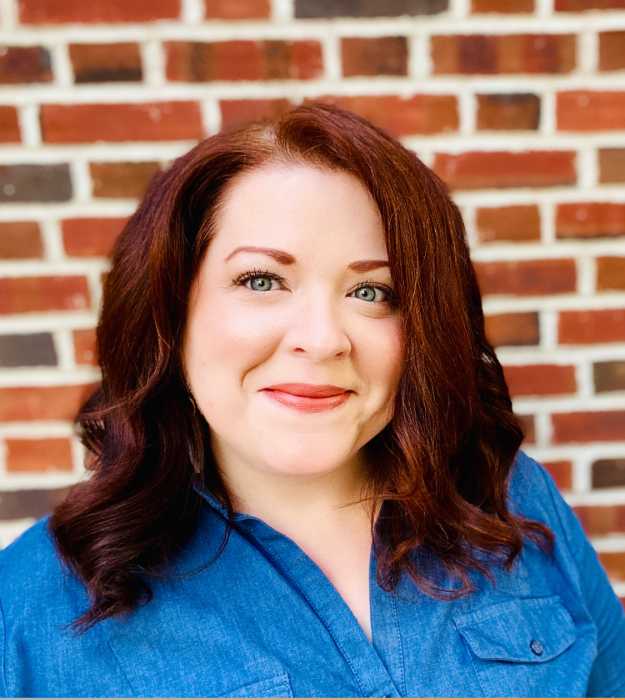
AnnaLee Dragon
Executive Director, New York Library Association

AnnaLee Dragon has been the executive director of the New York Library Association since February 2022. Prior to this, AnnaLee was the director of the Kinderhook Memorial Library in Columbia County for 10 years, where she led the organization through a successful capital campaign and building expansion/renovation. She received her M.S.I.S. from SUNY Albany in 2004 and holds a B.A. in English literature from Roger Williams University in Bristol, RI.
How can policymakers support New York’s students and educators?
One of NYLA’s budgetary priorities for the coming fiscal year is an increase in the state’s Library Materials Aid, or the amount of money school librarians can spend per pupil, which has been stagnant at $6.25 per pupil since 2007. As you can imagine, prices have increased dramatically since then, with the average cost of a book currently at $22. We need our legislators to invest in our students by investing in their school libraries.
What was your favorite moment or experience in your own education?
Given my career it may seem obvious, but school libraries had a large impact on my educational experience. The librarians encouraged my curiosity, taught me to use computers and the internet, and used books to open my eyes to the much wider world surrounding my very rural high school. I think those positive experiences influenced my whole education and my decision to become a librarian myself. The library has always represented possibility to me.
What is the best advice you have received from a mentor?
The best advice I have received is that you can be a leader and influence outcomes from any level. You do not need to be a director or a manager to make a difference to your organization or to those around you. Enthusiasm is contagious, and if you are excited about the work you’re doing, others will want to join you and help you reach your goals. Be the change you want to see.
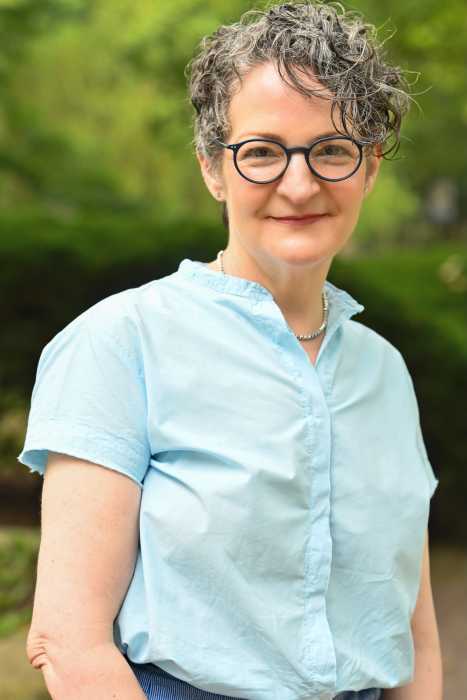
Suri Duitch
President, Kingsborough Community College, CUNY

Suri Duitch is the interim president of Kingsborough Community College (KCC) in Brooklyn. KCC is nationally known for its innovative and effective programs and practices that support students to enter the workforce or transfer to earn a bachelor’s degree. Prior to joining KCC, Duitch was dean of a college for working adults at Tulane University in New Orleans, and an administrator in the CUNY Central Office overseeing workforce development and adult education programs.
How can policymakers support New York’s students and educators?
New York policymakers play critical roles in supporting students in so many ways; through education policy; funding for institutions, special initiatives, and, of course, financial aid; and in representing students and educators, who are their direct constituents. All of these roles are important.
What was your favorite moment or experience in your own education?
I am so proud to be a CUNY alumna twice over – Hunter College and the CUNY Graduate Center, and to have the privilege of leading a CUNY institution is an amazing experience. There have been so many special moments, but leading Kingsborough’s commencement on June 18th was high on the list!
What is the best advice you have received from a mentor?
My mentors taught me to hold myself and my colleagues to the highest standards of performance in our jobs, understanding that it is both a privilege and a responsibility to lead and support access to an excellent public education for the diverse populations of New York City and State.
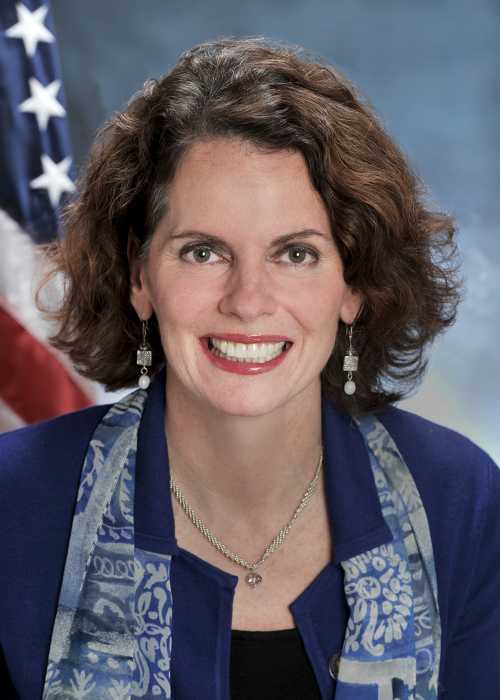
Patricia Fahy
Assembly Member, New York State Assembly | Chair, New York State Assembly Committee on Higher Education

First elected in 2012, NYS Assembly Member Patricia Fahy represents the entire City of Albany, Town of New Scotland, and part of the Town of Guilderland. A leading advocate for job creation, environmental conservation, and quality education, Pat has been the prime sponsor of over 200 bills – more than 70 of which have been signed into law.
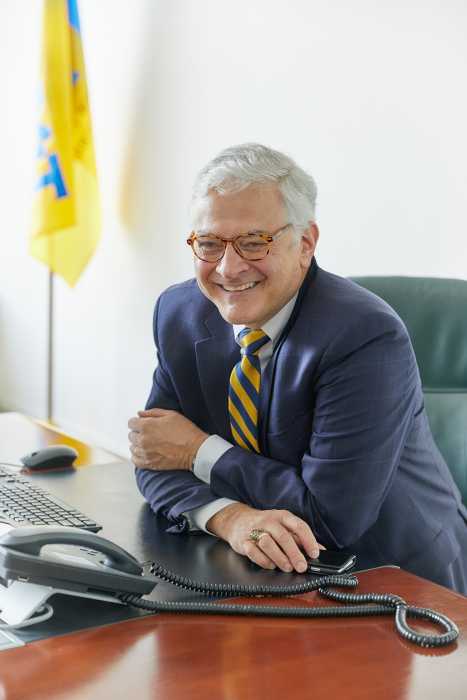
Henry Foley
President, New York Institute of Technology

Henry C. Foley, Ph.D., is president of the New York Institute of Technology. He joined the university in June 2017 after serving as interim chancellor of the University of Missouri-Columbia. Foley earned a bachelor’s degree in chemistry at Providence College, a master’s degree in chemistry from Purdue University, and a doctorate in physical and inorganic chemistry from Penn State. He has held faculty appointments in chemistry and chemical engineering at MU, Penn State, and the University of Delaware.
How can policymakers support New York’s students and educators?
Policymakers must put students first in all that they do. We all must take a comprehensive approach to analyzing the quality and effectiveness of public education. All students deserve to learn in safe schools with effective teaching. Education must prepare them for the challenges of working in a new and changing economy. Educational standards must be upheld and outcomes must be measured. Accountability needs to become a more prominent part of the state’s education policy.
What was your favorite moment or experience in your own education?
I very much enjoyed doing research as an undergraduate student. It was a life-changing experience for me. I went on to become a Ph.D. chemist and then a professor. So, it was not one moment, but a whole series of experiences that I look back on fondly.
What is the best advice you have received from a mentor?
Shed credit – never hold on to it. If you pass the credit onto students, colleagues, and coworkers, then more credit of the best kind will come back to you. Also, don’t be too impressed with yourself or your success, as there is always someone better out there.
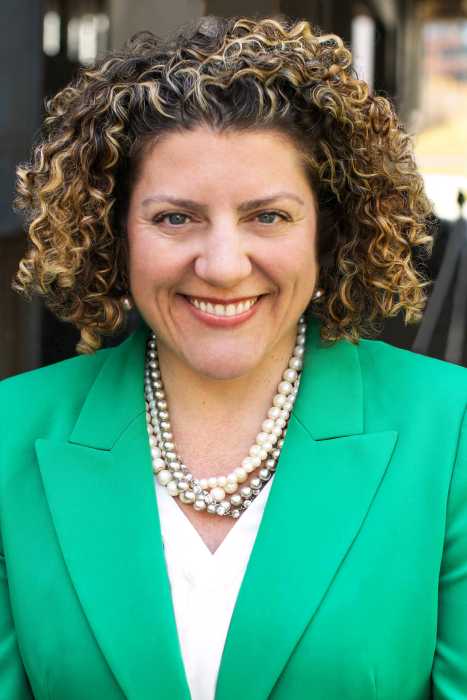
Christina Foti
Deputy Chancellor, Division of Inclusive and Accessible Learning, New York City Public Schools

Christina Foti is the deputy chancellor of the Division of Inclusive and Accessible Learning at NYC Public Schools, overseeing special education and multilingual programs. She previously led initiatives impacting over 270,000 students and families as chief of special education. Foti has expanded inclusive education programs, established sensory spaces, and launched Transition and College Access Centers citywide. She holds degrees from Vassar College, CUNY, Hunter College, and is pursuing a doctorate at Columbia University’s Teachers College.
How can policymakers support New York’s students and educators?
Policymakers must prioritize resources that expand bilingual education, specialized programs, and preschool services for students with disabilities. Advocating for equitable practices – like the Seal of Biliteracy and travel training – ensures multilingual learners and students with disabilities are prepared for life beyond school. Literacy initiatives like NYC Reads must be scaled to close achievement gaps, particularly for marginalized communities, creating pathways for success for every student, regardless of their background.
What was your favorite moment or experience in your own education?
While I had many meaningful experiences in my own education, one of my most powerful memories comes from my brother’s. Born with significant disabilities, his preschool stepping-up ceremony stood out. As the class made paper airplanes, one child couldn’t participate. My brother wheeled him to the center, calling him the landing pad. When a plane touched his head, his face lit up – that moment showed me what true inclusion and belonging look like.
What is the best advice you have received from a mentor?
A mentor once told me: never face challenges alone. This advice shaped my understanding of interdependence, especially in special education and among multilingual learners. By relying on each other’s strengths, we build communities where everyone can thrive. True inclusion happens when we embrace our collective power, ensuring that no one is left behind in the pursuit of equity and opportunity.
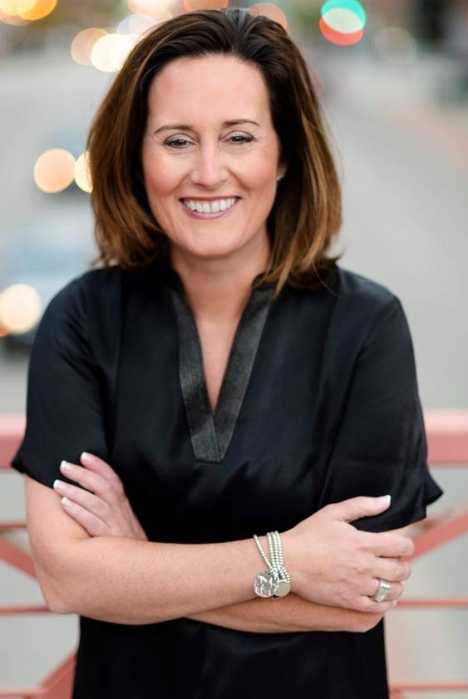
Rachael Gazdick
CEO, New York Edge

With more than 20 years of experience in education advocacy, New York Edge CEO Rachael Gazdick leads the organization’s mission to build equity in education and provide thousands of K-12 students with free, engaging programs that help them grow academically and personally. Previously, Gazdick served as president and CEO of Colorado’s “I Have A Dream” Foundation and as executive director of Say Yes to Education Syracuse.
How can policymakers support New York’s students and educators?
Policymakers can support students and educators by implementing policies that promote greater integration between schools and afterschool program providers. These programs are vital to students’ personal and academic development and should be viewed as extensions of the school day for all students. By prioritizing educational equity, we can ensure that thousands of public school students have access to enriching opportunities that remove barriers to their success.
What was your favorite moment or experience in your own education?
My favorite moment while pursuing my master’s degree at Harvard School of Education was witnessing Nelson Mandela’s last visit to the U.S. I have deep admiration for his dedication to social justice, human rights, and ending apartheid. During his address, he spoke about the importance of the next generation to continue his work. His words deeply inspired me, and I’ve taken this call to action seriously, shaping my commitment to making a difference.
What is the best advice you have received from a mentor?
The best advice I received from a mentor wasn’t spoken directly, but something I learned through her actions. She showed me the importance of honoring everyone’s stories with respect and dignity and responding to social justice issues by bringing people together. She fostered my growth through books, immersing me in communities, and teaching me how to organize. She always maintained a sense of humor, reminding me that despite the serious work, staying grounded is key.

Charles J. Gibbs
President, Metropolitan College of New York

Charles J. Gibbs, Ed.D. became president of Metropolitan College of New York (MCNY) on July 1, 2024. With over 25 years in higher education, Dr. Gibbs has led institutions to success. Previously, he was CEO of 100 Black Men of America and president of the Propel Center HBCU Consortium. Dr. Gibbs held leadership roles at Clark Atlanta, Miles College, and Howard University. A Howard University triple alumnus, he is dedicated to transforming education and fostering student success.
How can policymakers support New York’s students and educators?
As policymakers, your support is vital in ensuring equitable funding for institutions like Metropolitan College of New York, where many of our students overcome significant barriers to achieve their dreams. By investing in career-focused programs, expanding access to mental health services, and providing robust professional development for educators, you help us cultivate a thriving community. Together, we can create inclusive policies and opportunities that empower students to transform their lives and become leaders in our city.
What was your favorite moment or experience in your own education?
One of my best jobs in higher education was as a national recruiter for enrollment management. Meeting students at college recruiting fairs is an invaluable opportunity to connect with diverse scholars from around the world. I have met students who believe they have everything it takes to attend our nation’s colleges, and I have encountered those who are unsure if they can do it. Those are the ones I pursue aggressively because if you believe you can, you can. As a recruiter, I approached each interaction with enthusiasm and openness, actively listening to students’ goals and interests. I took pride in creating an inviting atmosphere that encouraged students to ask questions and share their experiences. Ultimately, fostering authentic connections during these events helps build lasting relationships and enhances the overall recruitment process. I believe these moments are the true legacy of our work.
What is the best advice you have received from a mentor?
The best advice I received from mentors often centered around the importance of resilience and adaptability. Many said, “Embrace challenges as opportunities for growth. Stay curious, focused, and never stop learning; each experience teaches something valuable.” They emphasized the importance of building strong relationships and seeking feedback to continually improve. Trust your instincts, but also be open to new perspectives. Remember, success is not just about the destination but the journey you’re on. Stay true to your values and pursue what genuinely inspires you.
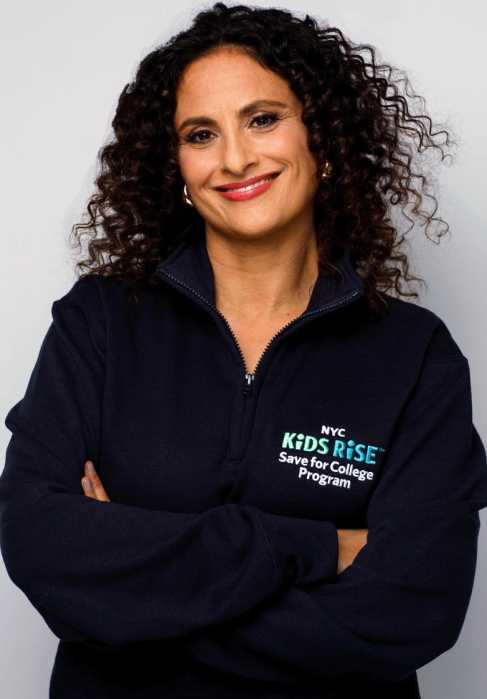
Debra-Ellen Glickstein
Founding Executive Director, NYC Kids RISE

Debra-Ellen is leading the effort to build a first-of-its-kind universal community-driven wealth-building platform for NYC neighborhoods. Through the Save for College Program, nearly every NYC public school first, second, and third grader now has a financial asset for their future. The kindergarten class will receive their NYC Scholarship Accounts in January and each year going forward. To date, more than 200,000 students have NYC Scholarship Accounts with nearly $35M accumulated for college and career training.
How can policymakers support New York’s students and educators?
529 plans are the country’s main state administered, tax-advantaged investment products that help families save for college and career education. With hundreds of billions of dollars invested in 529 plans across the country, they are a powerful wealth-building and economic opportunity catalyst. Policymakers should be ensuring that 529 plans are more accessible and inclusive to all families through comprehensively translating materials into languages other than English, and long-term investments in culturally-relevant engagement across communities.
What is the best advice you have received from a mentor?
“Commit to your neighborhood”. As a young person eager to make government work for folks, I joined forces with neighborhood leaders to expand access to services – financial counseling, workforce programs, even a credit union. Over a decade later, I got to work alongside my neighbors to launch the Save for College Program. Today, the community serves as an inspiration to others, using the Program as a springboard for opportunity.
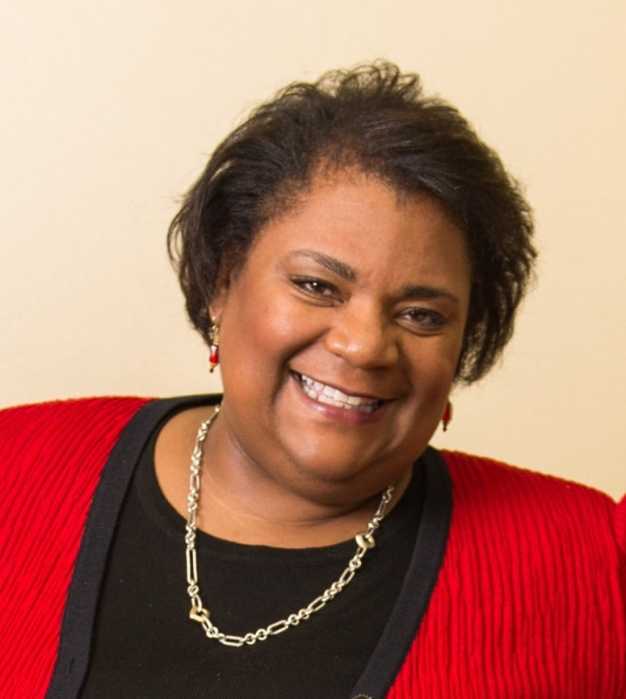
Carmen Green
Dean, The City University of New York School of Medicine

Carmen Renée Green, M.D., dean of CUNY Medicine, is a strategic and dynamic thought leader. Located in Harlem, the school houses an iconic seven-year BS/MD program and one of the nation’s oldest physician assistant programs. Under her leadership, it leads NY and the nation in producing medical professionals traditionally under-represented in medicine. Her research and vision of inclusive excellence focus on addressing social determinants of health and medical education to eliminate inequities in our time.
How can policymakers support New York’s students and educators?
Address the social determinants of higher education that prevent talented low-income, at-risk, and DACA students from being successful: food, transportation, and housing insecurity; sub-optimal access to wellness, tutoring, counseling, healthcare, and support services. Remove financial barriers, decrease unreasonable debt, and increase access to low-interest student loans, tuition assistance, scholarships, and loan forgiveness programs for those serving NY’s underserved communities. Such policies are critical for ensuring access to higher education and will help retain NY’s talent.
What was your favorite moment or experience in your own education?
Taking an idea to a hypothesis to a foundational study. Turning the results into other peer-reviewed manuscripts that are considered germinal for the field. This seminal work changed the landscape of the science of minority health and pain equity; leading to my ongoing advocacy and policy work. For this work I was awarded tenure and my tenure package was highlighted to the University Regents. It was gratifying to share this with my mother.
What is the best advice you have received from a mentor?
- Ancestors: There are three things you own: your name, your word, and your story. And, your integrity is not for sale.
- Mother: The person you look down on may offer you a drink of water when you are thirsty. People often deserve second chances; help when you can and try not to leave them behind.
- Mentor: There are paths that have not been made. Go where one does not exist and leave a trail.


